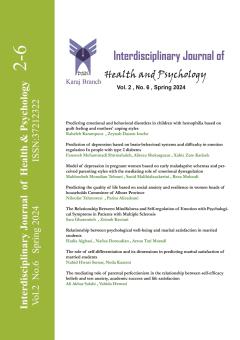Prediction of depression based on brain-behavioral systems and difficulty in emotion regulation In people with type 2 diabetes. (Authors:Fatemeh Mohammadi Shirmahaleh / Alireza Shokrgozar / Xabiz Zare Karizek)
Subject Areas : Medical Disease Manament
1 - Assistant Professor - Faculty Member of Islamic Azad University, Karaj Branch
Keywords: depression, emotion regulation difficulty, brain-behavioral system, type 2 diabetes,
Abstract :
Abstract This research was conducted with the aim of predicting depression based on brain-behavioral systems and difficulty in emotion regulation in people with type 2 diabetes. The research was descriptive-cross-sectional and correlational. All the patients with type 2 diabetes referred to the Armaghan diabetes clinic in Karaj in 2011, with the number of 218 people, formed the statistical population of the study, which was selected using the available sampling method, and 200 people were selected as a sample, and the research tools included these questionnaires: Revised Depression, Brain-Behavioral System Questionnaire and Emotion Regulation Difficulty Questionnaire answered. Data analysis was done at two levels of descriptive statistics and correlation coefficient test and multiple regression with SPSS-v26. The findings showed that the behavioral inhibition system has a positive and significant correlation with depression (r=0.519 and P<0.017) and there is a negative and significant correlation between the behavioral activation system and depression (r=0.519 and P<0.017). r=0 and P>0.022). Also, the results showed that there is a positive and significant correlation between the difficulty of emotion regulation and suffering from depression (r=0.545 and P<0.002). Based on research findings in medical centers, it is necessary to pay attention to the antecedents of depression and improve emotional regulation to increase the general health of people with diabetes.
منابع
امینی، فاطمه؛ سجادیان، ایلناز و ثالثی، منصور. (1399). رابطه باورهای مرتبط با درد و اضطراب با افسردگی در بیماران مبتلا به آرتریت روماتوئید. مجله درد و بیهوشی، 11(1)، 37-25.
ایمانی، سعید؛ الخلیل، یاسمین و شکری، امید. (1398). رابطه نگرش های ناکارآمد با اضطراب اجتماعی در نوجوانان: نقش میانجیگر تنظیم هیجان. مجله مطالعات روانشناسی تربیتی، 16(33)، 28-1.
بدیهی زراعتی، فرنوش؛ حسنی، جعفر و قاسمی مطلق، مهدی. (1400). رابطه فعالیت سیستم های مغزی-رفتاری و اضطراب بیماری با نقش واسطه ای راهبردهای شناختی تنظیم هیجانی. مجله دانشکده پزشکی، 64(1)، 2572- 2561.
بصیری مقدم، مهدی؛ سلیمانی، رسول و قدیمی فر، ابوالفضل. (1401). بررسی افسردگی و اضطراب دانشجویان دانشگاه علوم پزشکی گناباد شرکت کننده در مراسم اعتکاف. مطالعات اسلامی در حوزه سلامت، 6(2)، 96-87.
دوراندیش، فخری؛ روزبان، ثریا؛ شهنی فیض، کوثر و ابوذری، فاطمه. (1401). بررسی نقش دشواری در تنظیم هیجان، تحمل آشفتگی و استرس ادراک شده در پیش بینی پیروی از درمان در بیماران مبتلا به دیابت نوع دوم. مجله مدیریت پرستاری، 11(3):48-36.
دادفرنیا، شکوفه؛ هادیان فرد، حبیب؛ رحیمی، چنگیز و همکاران. (1399). تنظیم هیجان و نقش آن در پیش بینی نشانه های افسردگی در دانشجویان. مجله طلوع بهداشت یزد، 19(1)، 47-32.
داودیان، ملیکا؛ هاشمی پور، فرحناز؛ قلیچ خان، ناهید و همکاران. (1401). نقش انعطاف پذیری روانشناختی، دشواری در تنظیم هیجان و عدم تحمل ابهام در پیش بینی پریشانی روانشناختی و وسواس فکری-عملی در بیماران مبتلا به دیابت نوع دو در طول اپیدمی کرونا. فصلنامه مدیریت پرستاری، 11(2)، 77-65.
رامتین فر، هاله و علیزاده، ماندانا. (1399). رابطه طرحواره های ناسازگار اولیه با هوش هیجانی و تنظیم هیجان در سالمندان مبتلا به دیابت. مجله پرستاری و مامایی کردستان، 6(3)، 87- 77.
رامش، سمیه؛ قاضیان، مونا؛ رفیعی پور، امین و همکاران. (1397). نقش واسطه ای افسردگی و اضطراب بین تنظیم هیجان و خودمراقبتی در مبتلایان به دیابت نوع دو. مجله علمی پژوهان، 16(4)، 45-37.
رهبری غازانی، نسرین و باباپور، جلیل. (1397). نقش سیستم های مغزی-رفتاری و راهبردهای منفی و مثبت تنظیم هیجان در پیش بینی نشانگان افسردگی بیماران مبتلا به اختلال افسردگی اساسی. مجله علوم پزشکی رازی ایران، 25(10)، 70-61.
شمسیپور دهکردی، پروانه؛ عقدایی، مهین؛ ساجدی، راضیه و همکاران. (1400). تأثیر نوع سیستم مغزی-رفتاری بر سلامت روان شناختی ورزشکاران و غیرورزشکاران. مجله مطالعات روانشناسی ورزشی، 10(36)، 100- 81.
صفری موسوی، سیدسینا؛ نذری، مجتبی؛ امیری، میثم، رادفر، فرهاد و فرخچه، مهدی. (1398). نقش پیش بینی کنندگی انعطاف پذیری روانی و تنظیم هیجان بر افسردگی، اضطراب و استرس مبتلایان به دیابت نوع دوم. مجله مطالعات ناتوانی، 9(1)، 17-1.
عبدالرحیمی، لیلا. (1399). نقش سیستم های مغزی رفتاری و راهبردهای تنظیم هیجان در پیش بینی نشانگان اضطراب و افسردگی در بیماران مبتلا به دیابت نوع دوم. مجله پیشرفت های نوین در روانشناسی و علوم تربیتی، 4(24)، 103-93.
مفسری، محمدرسول؛ عیسی زادگان، علی و سلیمانی، اسماعیل. (1401). رابطه فعالیت سیستم های مغزی-رفتاری و اختلال اضطراب بیماری با نقش میانجیگری عدم تحمل بلاتکلیفی. ماهنامه علوم روانشناختی، 21(114)، 1213-1198.
وطن خواه، فرزانه؛ شمس، سارا؛ رشتیانی، فریبا و همکاران. (1400). رابطه بین سیستم های مغزی-رفتاری و دشواری در تنظیم هیجان با علائم افسردگی در افراد مبتلا به دیابت نوع دو نقش میانجی انعطاف پذیری شناختی. مجله رویش روانشناسی، 10(11)، 256-241.
Ajele, W. K., Oladejo, T. A., Akanni, A. A & et al. (2021). Spiritual intelligence, mindfulness, emotional dysregulation, depression relationship with mental well-being among persons with diabetes during COVID-19 pandemic. Journal of Diabetes & Metabolic Disorders, 20(2), 1705-1714.
Burkhouse, K. L., Dao, A., Argiros, A & et al. (2023). Targeting positive valence systems function in children of mothers with depressive symptoms: A pilot randomized trial of an RDoC-Informed preventive intervention. Behaviour Research and Therapy, 104384.
Beam, A. B., Wiebe, D. J., & Berg, C. A. (2021). Insulin restriction, emotion dysregulation, and depressive symptoms in Late adolescents with diabetes. Journal of pediatric psychology, 46(9), 1110-1118.
Coccaro EF, Drossos T, Kline D, Lazarus S, Joseph JJ, de Groot M. (2022). Diabetes distress, emotional regulation, HbA1c in people with diabetes and A controlled pilot study of an emotion-focused behavioral therapy intervention in adults with type 2 diabetes. Prim Care Diabetes. 16(3):381-386.
DeClercq, V., & Sweeney, E. (2022). Age and sex-specific associations in health risk factors for chronic disease: evidence from the Atlantic Partnership for Tomorrow’s Health cohort. Canadian Journal on Aging/La Revue canadienne du vieillissement, 41(2), 164-175.
He, T., Wang, W., Li, R & et al. (2022). Treatment of Diabetes Complicated with Depression from Liver and Lien. MEDS Clinical Medicine, 3(4), 110-114.
Heumann, M., Röhnsch, G., & Hämel, K. (2022). Primary healthcare nurses’ involvement in patient and community participation in the context of chronic diseases: An integrative review. Journal of Advanced Nursing, 78(1), 26-47.
Jiang C, Yin H, Liu A, Liu Q, Ma H, Geng Q. (2022). Dietary inflammatory index and depression risk in patients with chronic diseases and comorbidity. J Affect Disord. 301:307-314.
Kane, N. S., Hoogendoorn, C. J., Tanenbaum, M. L & et al. (2018). Physical symptom complaints, cognitive emotion regulation strategies, self‐compassion and diabetes distress among adults with Type 2 diabetes. Diabetic Medicine, 35(12), 1671-1677.
Kaur, H., Scholl, J. C., & Owens-Gary, M. (2022). Depression and diabetes in workers across the life span: addressing the health of america’s workforce—behavioral risk factor surveillance system, 2014–2018. Diabetes Spectrum, 35(2), 198-206.
Klein, S., Gastaldelli, A., Yki-Järvinen, H & et al. (2022). Why does obesity cause diabetes?. Cell metabolism, 34(1), 11-20.
Luby, J. L., Rogers, C., & McLaughlin, K. A. (2022). Environmental conditions to promote healthy childhood brain/behavioral development: Informing early preventive interventions for delivery in routine care. Biological psychiatry global open science, 2(3), 233-241.
Palomo-Osuna, J., Dueñas, M., Naranjo, C., De Sola, H., Salazar, A., & Failde, I. (2022). Factors related to cognitive function in type-2 diabetes and neuropathic pain patients, the role of mood and sleep disorders in this relationship. Scientific Reports, 12(1), 1-13.
Sun, J., Luo, Y., Chang, H., Zhang, R., Liu, R., Jiang, Y., & Xi, H. (2020). The mediating role of cognitive emotion regulation in BIS/BAS sensitivities, depression, and anxiety among community-dwelling older adults in China. Psychology Research and Behavior Management, 13, 939.
Turin, A., & Radobuljac, M. D. (2021). Psychosocial factors affecting the etiology and management of type 1 diabetes mellitus: A narrative review. World Journal of diabetes, 12(9), 1518.
Thumati, P., Kerstein, R., Yiannios, N & et al. (2018). Changes in the beck depression inventory-II scores of TMD subjects after measured occlusal treatment. Advanced Dental Technologies & Techniques, 5019.
Zeifman, R. J., Antony, M. M., & Kuo, J. R. (2020). When being imperfect just won't do: Exploring the relationship between perfectionism, emotion dysregulation, and suicidal ideation. Personality and Individual Differences, 152, 109612.

